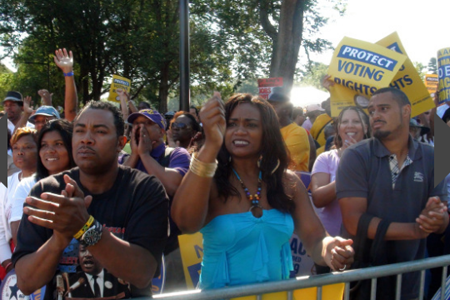
From the grounds of the Lincoln Memorial last Saturday, Rev. Al Sharpton‘s National Action Network s “Realize The Dream” march aimed to channel the same energy of the historic 1963 “March On Washington” which featured one of Dr. Martin Luther King Jr.‘s most riveting speeches. The rally, slightly marred by technical difficulties typical of live events, managed to inspire and uplift the thousands in attendance – and launched a new course of action for persons young and old as well.
Beginning early on a crisp, sunny morning in the shadow of the Washington Monument, vendors and attendees alike flooded Washington, as closed roads allowed for wider walking spaces. Largely Black and African-American families headed to the foot of the Lincoln Memorial, only to be met with a fence blocking many from getting near to the podium.
A long list of distinguished speakers, activists, organizers and leaders took the stage and were introduced by Academy Award winning actor Denzel Washington, with Lincoln’s statue serving as an imposing backdrop.
Rev. Jamal Bryant of the Empowerment Temple in Baltimore was one of the early notables, using his seasoned time in the pulpit to deliver a sermon-like message and at one point saying, “If Indians got reservations, African-Americans need reparations,” which received a hearty response. Georgetown University professor Michael Eric Dyson also rallied the audience with a chant of, “He [King] had a dream/We need a team” in his brief appearance.
The timekeepers of the March were unforgiving, as civil rights leaders Julian Bond and Rev. Jesse Jackson both had their speeches cut abruptly by the house band. This would be a recurring theme throughout the event until the end.
MSNBC’s Ed Schultz spoke in his impassioned, everyman style and urged both White and Black Americans to, “Pay attention to what’s going on in your own backyard” and spoke on the need for working class Americans to band together.
AFL-CIO Vice President Arlene Holt Baker, the first African-American to become an officer of the organization, delivered a fiery message. “We need jobs. We need freedom,” said Baker. “Shame on us if we return here 50 years later with the same demands.”
SEIU 1199 President George Gresham spoke with the same measured focus he’s become known for in the labor movement. “Why march if we don’t practice what we preach,” he asked rhetorically to the crowd. Gresham also mentioned the need to fight for fair housing, jobs and healthcare among the working class. He was followed by SEIU International president Mary Kay Henry, who spoke against the “twin demons of racism and economic inequality.”
National Action Network National Executive Director and NewsOne contributor Tamika Mallory also made an appearance, followed by MSNBC’s Krystal Ball who took over emceeing duties at a point. Attorney General Eric Holder‘s arrival at the Memorial caused a stir as Secret Service agents swarmed the area. Holder’s speech made mention of the Justice Department’s battle with the Supreme Court over the Voting Rights Act.
Newark Mayor and current New Jersey Senate candidate Cory Booker was met with cheers, and his speech recalled the lessons of his youth. “My father has told me never forget where you came from,” he shared. “He said you drank deep from the well of freedom and opportunity, but we still have work to do. Democracy is not a spectator sport. Democracy needs action. I’m calling upon my generation, it’s our obligation to pay it forward.”
The graceful widow of Megdar Evers, Merlie Evers-Williams, spoke directly to the family of Trayvon Martin, who were in attendance in the front row. “We know about ‘stand your ground’ but we need to stand firm on the ground that has already been made. Let’s flip stand your ground.” She continued with, “I stand here 80 years of age and I see all the changes that Dr. King envisioned in the crowd today.”
Georgia Representative John Lewis was introduced to the crowd by Tom Joyner, who warned the band not to cut the congressman short. Lewis, who stood at the same spot he held Saturday in 1963 as the youngest speaker at the March On Washington, was passionate in his call for action. “We must stand up and fight. One man, one vote. We cannot wait, we cannot be patient,” he urged of the audience regarding the upcoming elections and the Voting Rights Act. “Make some noise! We got to use our voice. Young people, push pull, and make America what it should be.”
Although the event was replete with big names, Chicago’sAsean Johnson, just 9 years of age, thrilled crowds by artfully recalling Rep. Lewis being the youngest speaker but upstaging him by saying, “Now I’m the youngest speaker on the March On Washington.”
The last two speakers, Martin Luther King III and Rev. Al Sharpton saved the best for last. King spoke on his father’s legacy, while looking at his wife and daughter off to the side. “50 years ago, my father insisted we not rest over the right to vote,” he said. “We must fight back boldly. We ain’t gonna let nobody turn us around.”
Sharpton did not mince words in his introduction, speaking to silent critics in quick fashion. “This March is being miscast as some social event and it is not,” said Sharpton in a serious tone, who told a tale of a person who said that the civil rights fight had nothing to do with his academic and personal achievements. “Don’t act like whatever you achieved in your life happened because you’re smart. It happened because of changes that happened before you.”
Read more https://newsone.com/2697334/recapping-the-national-action-networks-realize-the-dream-march-in-dc/